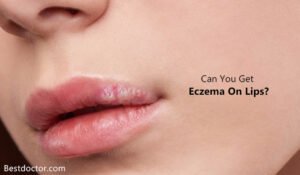Eczema on the lips, also known as lip dermatitis or eczematous cheilitis, is a condition that can affect the sensitive skin of the lips. It can be uncomfortable and unsightly, making it difficult to enjoy everyday activities like eating, talking, or smiling. Understanding the different types, causes, symptoms, and treatment options can help you manage this condition effectively.

Types of Lip Eczema
There are several types of eczema that can affect the lips, each with unique characteristics:
- Contact Dermatitis: This occurs when the lips come into contact with an irritant or allergen, such as fragrances, preservatives, or metals like nickel. Symptoms include redness, swelling, itching, and sometimes blistering.
- Atopic Dermatitis: A chronic form of eczema that is often associated with allergies and asthma. Atopic dermatitis on the lips can cause dryness, scaling, and intense itching. The skin may also crack or bleed, leading to pain and discomfort.
- Cheilitis Simplex: This condition causes dryness and peeling of the lips, often triggered by weather changes, dehydration, or excessive lip licking. It leads to chapped, cracked lips and can cause self-consciousness.
Symptoms of Lip Eczema
Lip eczema can present itself with a variety of symptoms, including:
- Dryness and Flakiness: The lips may feel rough, scaly, and parched. This is often exacerbated by weather conditions such as cold, windy days.
- Redness and Inflammation: The skin may become swollen, irritated, and sensitive to touch.
- Blisters or Vesicles: Small fluid-filled bumps may appear, which can be itchy or painful. These may rupture, leading to oozing and crusting.
It’s crucial to avoid scratching the affected area, as it can worsen inflammation and lead to infection.
Common Triggers of Lip Eczema
Several factors can trigger or worsen lip eczema, including:
- Allergens and Irritants: Common triggers include food items like citrus fruits and tomatoes, certain lip products (fragrances, preservatives), and environmental pollutants.
- Dryness and Dehydration: Dry, cracked lips are an ideal environment for eczema to develop. Weather conditions (cold or windy weather), central heating, and excessive licking of the lips can all contribute.
- Stress: Emotional stress can weaken the immune system and make the skin more prone to irritation.
Identifying your specific triggers through a journal or observation can help you manage flare-ups.
Causes and Risk Factors of Lip Eczema
The causes and risk factors for lip eczema can vary, but some of the most common include:
- Allergic Reactions: Certain substances in lip balms, toothpaste, or food products can cause eczema flare-ups.
- Genetics: A family history of atopic dermatitis or other allergic conditions increases the likelihood of developing lip eczema.
- Environmental Factors: Dry or cold weather can strip the skin of moisture, contributing to the condition.
Understanding these factors can help in both preventing and managing lip eczema.
Diagnosing Lip Eczema
To diagnose lip eczema, a healthcare provider will typically perform a physical examination of the affected area. They will look for signs of redness, scaling, blistering, or swelling. If necessary, they may recommend tests, such as skin patch testing or allergy testing, to determine the triggers.
It’s important to differentiate lip eczema from other conditions like cold sores or angular cheilitis, as these may require different treatments.
Treatments and Home Remedies for Lip Eczema
There are several approaches to treating lip eczema:
- Topical Corticosteroids: These can reduce inflammation and itching. It is crucial to use them as directed to avoid side effects, such as thinning of the skin.
- Moisturizers: Keeping the lips hydrated with hypoallergenic and fragrance-free lip balms can help soothe irritation. Look for products containing petrolatum or beeswax to create a protective barrier.
- Natural Remedies: Coconut oil has moisturizing and anti-inflammatory properties, making it a popular option for lip eczema. Apply a thin layer of organic, cold-pressed coconut oil to the lips to help reduce redness and dryness.
Preventing Lip Eczema
To prevent lip eczema flare-ups, consider these strategies:
- Avoid Triggers: Be mindful of food allergies, skincare products, and environmental factors that can cause flare-ups.
- Proper Lip Care: Use gentle, fragrance-free lip balms to keep lips hydrated. Products with shea butter or coconut oil can soothe the skin and prevent further irritation.
- Avoid Licking Your Lips: Saliva can dry out the skin on your lips, making eczema worse.
- Hygiene: Wash your hands before touching your lips or applying any products, and avoid using contaminated utensils.
Frequently Asked Questions
- Is Lip Eczema Contagious? No, lip eczema is not contagious. It is caused by various factors, including genetics, allergens, and environmental triggers.
- Can Diet Affect Lip Eczema? While no specific diet can cure lip eczema, certain foods may trigger flare-ups in some individuals. Keeping a food diary may help you identify potential triggers.
- Are Natural Remedies Effective? Some natural remedies like coconut oil, shea butter, and aloe vera may help soothe eczema symptoms. However, always consult with a healthcare provider before trying new treatments.
Conclusion
Eczema on the lips can be a challenging condition, but understanding its causes, symptoms, and treatments can help individuals manage and prevent flare-ups. By being proactive in identifying triggers, maintaining a consistent skincare routine, and seeking medical guidance when necessary, you can effectively manage lip eczema and reduce its impact on your life.
For additional information on eczema management and treatment, check out these useful resources:
With the right knowledge and care, managing lip eczema becomes more manageable, allowing you to keep your skin healthy and comfortable.